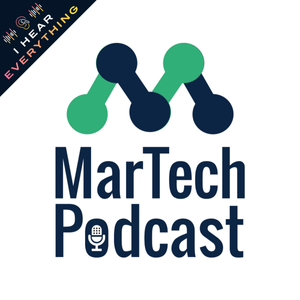
EP 22: NFT, Bonding Curves and Harberger Taxes w Simon de la Rouviere
08/27/20 • 34 min
Today, we have a guest on our episode, Simon de la Rouviere. He's known to start talking actively about bonding curves and it's making a huge impact to the future that we are building — #DeFi and crypto.
Things we covered:
- What are Harberger Taxes
- Evolution of "Art is Always on Sale" V1 vs V2
- Patronage as an asset class
- Taxation and its impact on time horizon of holding assets
- Relationship between art work and incentive to artist
- Bonding curve with NFT via a price floor
- Utility as a marginal incentive function in bonding curve
- Various curve relationships between art and prices
- Governance in NFT
- Sustainable funding and efficient economy for artist
- Combining DeFi with Bonding Curve for collectible art and virtual assets
- Bonding curve uses in personal tokens
- 2 advice to economic and system designers
Some links on the things we talked about:
- Radical markets [Book] — https://amzn.to/31wRteX
- Cadcad [Programming] — https://cadcad.org/
- Wild Cards [Project] — https://devpost.com/software/ethcapetown_wildcards
- This Artwork Is Always On Sale v2 — https://blog.simondlr.com/posts/this-artwork-is-always-on-sale-v2
- Exploring Harberger Tax Rates in Virtual Collectibles & Patronage Markets — https://blog.simondlr.com/posts/exploring-harberger-tax-in-patronage-markets
- Patronage As An Asset Class — https://blog.simondlr.com/posts/patronage-as-an-asset-class
Want more in-depth content? Join our Token Economics 201 course at www.education.economicsdesign.com!
Today, we have a guest on our episode, Simon de la Rouviere. He's known to start talking actively about bonding curves and it's making a huge impact to the future that we are building — #DeFi and crypto.
Things we covered:
- What are Harberger Taxes
- Evolution of "Art is Always on Sale" V1 vs V2
- Patronage as an asset class
- Taxation and its impact on time horizon of holding assets
- Relationship between art work and incentive to artist
- Bonding curve with NFT via a price floor
- Utility as a marginal incentive function in bonding curve
- Various curve relationships between art and prices
- Governance in NFT
- Sustainable funding and efficient economy for artist
- Combining DeFi with Bonding Curve for collectible art and virtual assets
- Bonding curve uses in personal tokens
- 2 advice to economic and system designers
Some links on the things we talked about:
- Radical markets [Book] — https://amzn.to/31wRteX
- Cadcad [Programming] — https://cadcad.org/
- Wild Cards [Project] — https://devpost.com/software/ethcapetown_wildcards
- This Artwork Is Always On Sale v2 — https://blog.simondlr.com/posts/this-artwork-is-always-on-sale-v2
- Exploring Harberger Tax Rates in Virtual Collectibles & Patronage Markets — https://blog.simondlr.com/posts/exploring-harberger-tax-in-patronage-markets
- Patronage As An Asset Class — https://blog.simondlr.com/posts/patronage-as-an-asset-class
Want more in-depth content? Join our Token Economics 201 course at www.education.economicsdesign.com!
Previous Episode
![undefined - EP 21: What is Ampleforth? The Economics Design of AMPL Token [Case Study]](https://storage.googleapis.com/goodpods-images-bucket/episode_images/ca4c0a6c618a1f3e0b20cee4dbce58fc5507558fcf85f6f6472a1730a8ae857f.avif)
EP 21: What is Ampleforth? The Economics Design of AMPL Token [Case Study]
What is Ampleforth? What is supply elasticity? Why do I have more tokens and suddenly less tokens? Where does Ampleforth come in, in the #DeFi space? How does Ampleforth work?! I don't understand Ampleforth!
Fret not, let's start Season 2 with a deep dive and case study of Ampleforth, using the Economics Design framework for tokens.
Things covered:
- What is Ampleforth
- Objective of Ampleforth
- Token function
- AMPL vs AAVE
- AMPL vs COMP
- AMPL vs USD
- Economics design framework
- Main USP of AMPL
- What is Synthetic commodity money
- Economics utility vs financial utility of AMPL
- How AMPL works using example of hot and cold water
- Monetary policy of Ampleforth
- Graph analysis of AMPL
- Valuation model for AMPL
- Global trade impacts of AMPL
- Distribution and allocation analysis of AMPL
Want more case studies like these? Subscribe to the premium version of the Patreon to unlock bi-weekly videos like these!
Next Episode

EP 23: How to use Bonding Curve Beyond DeFi
We've talked about bonding curves so many times. You'd think I've exhausted the content. HAH! Not a chance.
Today, we have with us Jeff Emmett from the Common Stacks team, sharing with us about augmented bonding curves, generalised bonding curves and various "behind the scene" concepts of bonding curves.
Absolutely follow him on twitter at https://twitter.com/jeffemmett.
Want more in-depth content? Sign up at our Patreon at https://www.patreon.com/economicsdesign
If you like this episode you’ll love
Episode Comments
Generate a badge
Get a badge for your website that links back to this episode
<a href="https://goodpods.com/podcasts/economics-design-12861/ep-22-nft-bonding-curves-and-harberger-taxes-w-simon-de-la-rouviere-7320980"> <img src="https://storage.googleapis.com/goodpods-images-bucket/badges/generic-badge-1.svg" alt="listen to ep 22: nft, bonding curves and harberger taxes w simon de la rouviere on goodpods" style="width: 225px" /> </a>
Copy




